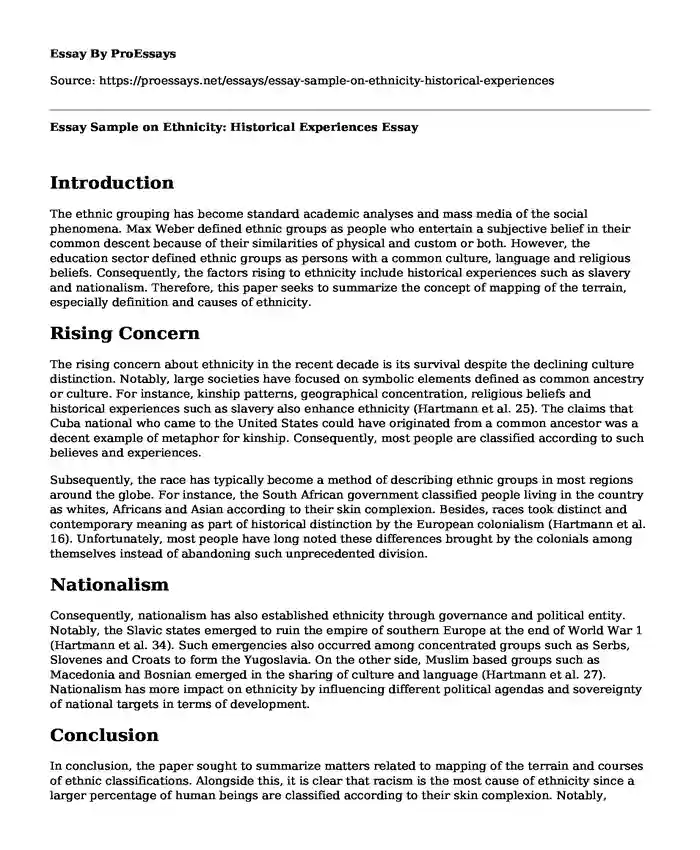Introduction
The ethnic grouping has become standard academic analyses and mass media of the social phenomena. Max Weber defined ethnic groups as people who entertain a subjective belief in their common descent because of their similarities of physical and custom or both. However, the education sector defined ethnic groups as persons with a common culture, language and religious beliefs. Consequently, the factors rising to ethnicity include historical experiences such as slavery and nationalism. Therefore, this paper seeks to summarize the concept of mapping of the terrain, especially definition and causes of ethnicity.
Rising Concern
The rising concern about ethnicity in the recent decade is its survival despite the declining culture distinction. Notably, large societies have focused on symbolic elements defined as common ancestry or culture. For instance, kinship patterns, geographical concentration, religious beliefs and historical experiences such as slavery also enhance ethnicity (Hartmann et al. 25). The claims that Cuba national who came to the United States could have originated from a common ancestor was a decent example of metaphor for kinship. Consequently, most people are classified according to such believes and experiences.
Subsequently, the race has typically become a method of describing ethnic groups in most regions around the globe. For instance, the South African government classified people living in the country as whites, Africans and Asian according to their skin complexion. Besides, races took distinct and contemporary meaning as part of historical distinction by the European colonialism (Hartmann et al. 16). Unfortunately, most people have long noted these differences brought by the colonials among themselves instead of abandoning such unprecedented division.
Nationalism
Consequently, nationalism has also established ethnicity through governance and political entity. Notably, the Slavic states emerged to ruin the empire of southern Europe at the end of World War 1 (Hartmann et al. 34). Such emergencies also occurred among concentrated groups such as Serbs, Slovenes and Croats to form the Yugoslavia. On the other side, Muslim based groups such as Macedonia and Bosnian emerged in the sharing of culture and language (Hartmann et al. 27). Nationalism has more impact on ethnicity by influencing different political agendas and sovereignty of national targets in terms of development.
Conclusion
In conclusion, the paper sought to summarize matters related to mapping of the terrain and courses of ethnic classifications. Alongside this, it is clear that racism is the most cause of ethnicity since a larger percentage of human beings are classified according to their skin complexion. Notably, nationalism and historical experiences also result in ethnicity under various circumstances. Therefore, this paper recommends national governments to consider the unity of people and equal treatment of everyone.
References
Hartmann, Douglas, and Cornell, Stephen. "Mapping the Terrain: Definitions " Ethnicity and race: making identities in a changing world. India, SAGE Publications, 2007.
Cite this page
Essay Sample on Ethnicity: Historical Experiences. (2023, Nov 16). Retrieved from https://proessays.net/essays/essay-sample-on-ethnicity-historical-experiences
If you are the original author of this essay and no longer wish to have it published on the ProEssays website, please click below to request its removal:
- Political Philosophy Essay: Realism and Liberalism
- Speech for Graduation Example
- Proposed Policy Changes on Philippine Health Care System - Paper Example
- Paper Example on Social Issues Facing America Today
- Essay Example on Exploring the Differences: Contact Zone vs Community
- Essay Sample on Types of Government: Shaping Society & Human Wellbeing
- Music: Enhancing Health and Promoting Harmony - Research Paper







